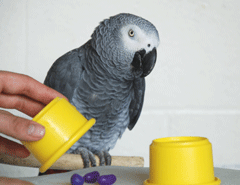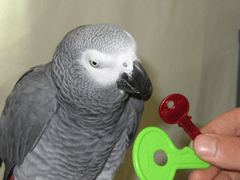Alex (1976 – 2007)
Air Date: Week of September 21, 2007

(Photo: Arlene Levin-Rowe, the Alex Foundation)
When Alex the Grey parrot died this month, author Sy Montgomery says the world lost a bird who broke down the barrier between animals and humans. She offers this tribute.
Transcript
CURWOOD: At the time of his death earlier this month at the age of 31, he was working with researchers at Harvard and Brandeis universities. As a fan who followed his career for more than two decades, Sy Montgomery offers this tribute to Alex the parrot.
MONTGOMERY: When he died, I felt like some folks did when Elvis Presley or Lady Diana passed away. Alex the African Grey Parrot was one of my heroes.
Ever since he left the pet store for the lab, Alex had worked with researcher Irene Pepperberg on a monumental project. For most of his life, he studied the English language—and in doing so, changed the way humans look at our place as a species in the great order of life.

(Arlene Levin-Rowe, the Alex Foundation)
First Washoe the chimp—later Koko the gorilla—learned American Sign Language. Then dolphins and sea lions learned to touch word-like symbols in syntactical order. There were others. But some linguist or other was always shooting them down. They complained the animals weren’t using language as we do.

(Photo: Arlene Levin-Rowe, the Alex Foundation)
Alex revealed a mind remarkably like ours. His last words, spoken to Pepperberg the night before he died, were these: “You be good. See you tomorrow. I love you.” Some still claim Alex wasn’t really using language. But I mean, come on! Here he is, telling us, in plain English, that he wants a nut! What could be clearer than that?
When Alex spoke, a member of a species more closely related to dinosaurs than to humans was talking with us. And that answered the question, for me anyway, beyond any doubt: Language is not the uncrossable barrier between people and animals. Which suggests this ‘great divide’ between our kind and other species is just something we made up.
In speaking his mind so clearly, Alex has done us a great service. He has helped to reunite humanity with the rest of the living world.
[WOMAN SPEAKING WITH PARROT]
Links
Living on Earth wants to hear from you!
Living on Earth
62 Calef Highway, Suite 212
Lee, NH 03861
Telephone: 617-287-4121
E-mail: comments@loe.org
Newsletter [Click here]
Donate to Living on Earth!
Living on Earth is an independent media program and relies entirely on contributions from listeners and institutions supporting public service. Please donate now to preserve an independent environmental voice.
NewsletterLiving on Earth offers a weekly delivery of the show's rundown to your mailbox. Sign up for our newsletter today!
 Sailors For The Sea: Be the change you want to sea.
Sailors For The Sea: Be the change you want to sea.
 The Grantham Foundation for the Protection of the Environment: Committed to protecting and improving the health of the global environment.
The Grantham Foundation for the Protection of the Environment: Committed to protecting and improving the health of the global environment.
 Contribute to Living on Earth and receive, as our gift to you, an archival print of one of Mark Seth Lender's extraordinary wildlife photographs. Follow the link to see Mark's current collection of photographs.
Contribute to Living on Earth and receive, as our gift to you, an archival print of one of Mark Seth Lender's extraordinary wildlife photographs. Follow the link to see Mark's current collection of photographs.
 Buy a signed copy of Mark Seth Lender's book Smeagull the Seagull & support Living on Earth
Buy a signed copy of Mark Seth Lender's book Smeagull the Seagull & support Living on Earth

